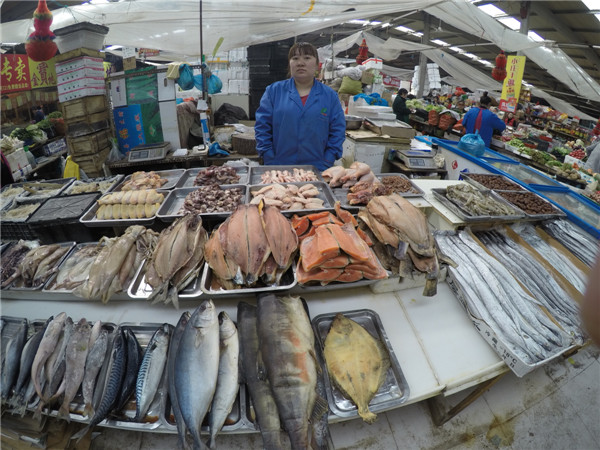 |
|
Different kinds of salted fish from Russia are one of the specialities found in the market in Hunchun. [Photo by Chen Liang/China Daily] |
Their group breakfast was busy and lasted for nearly 40 minutes. Then they left toward a lake beyond the fields. They did not seem afraid of people. Zhang explained that the county government and border guards stationed at Jingxin have been monitoring migratory birds passing through the area for the past few years in an attempt to prevent poachers approaching the wild birds.
We drove to the biggest lake in the wetland, which covers an area of 8,000 hectares and is only 4 kilometers west of the Russian coast. "Not far from the sea, Jinxin is usually warmer than nearby mountainous areas," Zhang said.
A cement road stretches along the western bank of the lake, from where people can easily see thousands of ducks feeding and resting on the water. Their different plumages show they are different species. Mallards, mergansers and coots are the bravest of the birds, swimming just dozen meters ways from the bank. On the scattered drift ice stand several eagles with yellow bills and pale brown plumage. They looked indifferent to excited tourists and photographers on the bank.
Few geese stay on the water. They prefer farmland and grassy slopes near the lakes. While driving on dirt roads zigzagging through the area, I was amazed by their numbers. Often moving in a cloud and in noisy group callings, they seemed to be everywhere.
At dusk, after watching the sunshine tinged the lake and flocks of water birds, we chose a side road back to the township and fortunately saw wild geese roosting in the fields in close range. How close? You could see their eyes and their nervousness while finding a car slowly driving by. We didn't stop the car to get off. As invaders, we were already too close to their habitat.
The next day we explore several side roads through mountainous areas near Jingxin. These roads often lead to small settlements on the border between China and the DPRK. Because many young ethnically Korean people move to the Republic of Korea for better jobs, Zhang said, some of the villages are deserted. The forests are dominated by oak trees with birch and pine trees scattered around. Most of the trees are budding with tender leaves. Hiking through the forest, one can reach the border, defined by the winding Tumen River. Through the iron fencing, one can glimpse the calm and clear river. The landscape on the DPRK side is a little empty with barren slopes, few trees, houses, and several patches of fields. I didn't see any people working in the fields.
I left my last morning in Chunhua to explore one of the biggest free markets in the town. Only in the market do you truly realize that Hunchun is actually close to the sea - barely 20 kilometers away from the Russian coast. Seafood is everywhere. Huge, fresh king crabs and queen crabs from Russia are sold in shops specifically for fresh seafood. A kilogram of king crabs is 140 yuan ($22.54) and a kg of queen crabs 200 yuan. Besides, there is fresh squid, octopus, crab and shrimp. Many stands in the market feature dried pollacks from the DPRK, a popular source of protein for the Korean community in Hunchun. There are also stands selling salted salmon, different kinds of dried seafood and Korean pickles. With so many ingredients available in the market, you don't need to worry about finding a decent restaurant in Hunchun.
|
|
|
|
|
|
|
|
